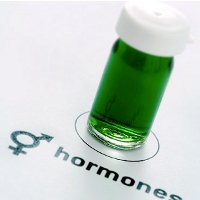Human Hormones and Glands

With so many large and small endocrine glands, it is not surprising that dozens of different hormones produced by the body every day. Some glands produce only one or two hormones, while others may be more than a dozen. There are two main types of hormones that are produced from amino acids (such as proteins) and those derived from cholesterol.
Some hormones are made by changing a single amino acid, such as serotonin, melatonin, epinephrine, and thyroid. cholesterol hormones are also known as steroid hormones. These include the sex hormones (testosterone, estrogen and progesterone), cortisol, aldosterone, and many others. Steroids The name comes from its unique chemical structure of a molecule containing four rings of cholesterol (cholesterol sterols) and a side chain.
Pituitary regulates and supervises most of the other endocrine glands. Some pituitary hormones increase or decrease the activity of the thyroid, adrenals, testes and ovaries. Others have a direct effect on some tissues of the body. The thyroid gland is located in front of the neck. The thyroid gland produces thyroxine, which is also known as thyroid hormone. Thyroid hormone control of general metabolism of the cells for energy production, cell growth and development.
The parathyroid glands is actually a group of four glands in the neck near the thyroid gland. They produce parathyroid hormone, which regulates the concentration of calcium in the blood, promoting the release of calcium from bone, increases calcium absorption in the intestine, and promoting conservation of calcium in the kidneys. The pancreas is known to be the organ that produces digestive enzyme that is involved in food spoilage. However, it also functions as an endocrine gland makes two hormones insulin and glucagon. Both are involved in the regulation of glucose (sugar) levels.
Both males and females have two adrenal glands located on top of the kidneys. Despite its small size, the adrenal glands fail to produce various hormones which have a significant impact on various body functions. Aldosterone, which regulates fluid balance by changing the amount of water absorbed and excreted through the kidneys, is one of the most important hormones produced by the adrenal glands. Known as the cortisol stress hormone supports the use of nutrients to the cells during stress and reduce inflammation. The adrenaline and noradrenaline and increased heart rate, cardiac output, blood pressure, respiratory rate, and overall metabolic rate.
Dehydroepiandrosterone (DHEA) to improve the utilization of glucose, the function of the immune system and cardiovascular performance. In addition, the adrenal glands to produce progesterone, pregnenolone, androstenedione, and many other hormones.
The pineal gland makes melatonin, a hormone that tells the organs to switch to a night-time mode of activity. It is also a potent anti-oxidant. Melatonin is used as a supplement to help improve sleep quality and to minimize the effects of jet lag.
Testis are male endocrine organs that produce testosterone, which is responsible for the development of sexual characteristics, libido, muscle mass, bone strength, immune system, and other functions. Even though testosterone is called a 'male sex hormone' it is also present in small amounts in women and supports the same functions as in men.
Ovaries are not necessary a gland, but they are responsible for the release of hormones into the female body. Aside from releasing storing eggs, they produce progesterone and estrogens, which are responsible for maintaining a normal menstrual cycle and a number of other functions. All of the glands have an important part in keeping the body healthy by producing hormones that help the body function properly. Some are more susceptible to malfunctioning or under producing hormones than others. Occasionally, hormones are the culprits behind certain unexplained changes in our bodies that affect weight, libido, or sleep patterns. If you are concerned about your health, you should seek medical advice from your physician.
Nutrition
Why Do People Gain Weight So Quickly After Losing It?
 Slide Down || Slide Up
Slide Down || Slide Up
The Symptoms of Inflammation Can Be Deadly
 Slide Down || Slide Up
Slide Down || Slide Up
Reasons Why Water Is The Best Drink Ever
 Slide Down || Slide Up
Slide Down || Slide Up
Meal Replacement For Weight Loss: The 6 Best Ingredients
 Slide Down || Slide Up
Slide Down || Slide Up
Lose Weight With Shakeology - How Does It Work?
 Slide Down || Slide Up
Slide Down || Slide Up
Health Drinks: Experience Healthy Acai Berry Fruit Drinks
 Slide Down || Slide Up
Slide Down || Slide Up
5 Easy Ways to Cut the Fat Fast
 Slide Down || Slide Up
Slide Down || Slide Up




.jpg)








.jpg)
